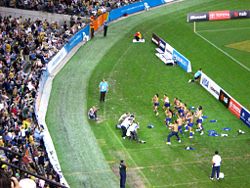- Meke
-
Meke is a broad term in the Fijian language, primarily referring to all traditional style of dance. It is a cognate of the words "maka" (Rotuman) and "mele" (Hawaiian)[citation needed]. It is typically performed during celebrations and festivals. Traditionally the dances that comprise the meke art form are performed by groups of men only or women only, however, foreign influences, such as the male/female Tongan ma'ulu'ulu becoming the Fijian vakamalolo, are evident throughout.
Professor Friedrich Ratzel in his 1896 publication (Macmillan of London), The History of Mankind,[1] writes about the Fijian meke as both song and dance which only a few are given to invent and which those who do, allege that they do so in the spirit world where divine beings teach them the song and the appropriate dance. He wrote that the ideal of the Fijian poet is poetry with every verse ending with the same vowell of regular measure, which, in practice is often achieved with poetic license through the use of arbitrary abbreviations or lengthenings, and omission of articles, etc.
References
- ^ Ratzel, Friedrich. The History of Mankind. (London: MacMillan, 1896). URL: www.inquirewithin.biz/history/american_pacific/oceania/melanesian-population.htm accessed 9 October 2009.
See also
Dance in Oceania Sovereign states Dependencies and
other territories- American Samoa
- Christmas Island
- Cocos (Keeling) Islands
- Cook Islands
- Easter Island
- French Polynesia
- Guam
- Hawaii
- New Caledonia
- Niue
- Norfolk Island
- Northern Mariana Islands
- Pitcairn Islands
- Tokelau
- Wallis and Futuna
List of resources about traditional arts and culture of Oceania Art ahu · Australia · Austronesia · Cook Islands · Hawaiʻi · kapa (Hawaiʻi) · lei (Hawaii) · magimagi · Māori · moai · New Zealand · nguzu nguzu · Oceania · Papua New Guinea · reimiro · tā moko · tapa ["masi" (Fiji), "ngatu" (Tonga), "siapo" (Sāmoa), " ʻuha" (Rotuma)] · tabua · ta'ovala · tattoo · tēfui · tivaivaiBroad culture Geo-specific, general Australia · Australian Aboriginal astronomy · Austronesia · Caroline Islands, -Pwo · Chatham Islands · Cook Islands · Easter Island · Fiji, -Lau Islands, -traditions and ceremonies · Guam · Hawaiʻi, -Lomilomi massage · Kiribati · French Polynesia's Marquesas Islands · Marshall Islands, -Stick charts of · Federated States of Micronesia · Nauru · New Caledonia · New Zealand · Niue · Norfolk Island · Palau · Papua New Guinea · Pitcairn Islands · Sāmoa · Solomon Islands · Tonga · Torres Strait Islands · Tuvalu · Vanuatu · Wallis and Futuna · Yap, -navigation, -Weriyeng navigation schoolCanoes Aboriginal Dugout · Alingano Maisu · Drua · Dugout (boat) · Hawaiʻiloa · Hōkūleʻa · Modern Hawaiian outrigger · Māori migration · Outrigger · Polynesian sailing · Proa · Waka,-List of · WalapDance Festivals Australia's Garma Festival · Hawaiʻi's Aloha Festivals, Merrie Monarch Festival, and World Invitational Hula Festival · Fiji · New Zealand's Pasifika Festival · The Pacific Community's Festival of Pacific Arts · Festivals in Papua New GuineaLanguages by areaLanguages of Oceania Sovereign states - Australia
- East Timor (Timor-Leste)
- Fiji
- Indonesia
- Kiribati
- Marshall Islands
- Federated States of Micronesia
- Nauru
- New Zealand
- Palau
- Papua New Guinea
- Samoa
- Solomon Islands
- Tonga
- Tuvalu
- Vanuatu
Dependencies and
other territories- American Samoa
- Christmas Island
- Cocos (Keeling) Islands
- Cook Islands
- Easter Island
- French Polynesia
- Guam
- Hawaii
- New Caledonia
- Niue
- Norfolk Island
- Northern Mariana Islands
- Pitcairn Islands
- Tokelau
- Wallis and Futuna
by categoryLiterature Literature of Oceania Sovereign states - Australia
- East Timor (Timor-Leste)
- Fiji
- Indonesia
- Kiribati
- Marshall Islands
- Federated States of Micronesia
- Nauru
- New Zealand
- Palau
- Papua New Guinea
- Samoa
- Solomon Islands
- Tonga
- Tuvalu
- Vanuatu
Dependencies and
other territories- American Samoa
- Christmas Island
- Cocos (Keeling) Islands
- Cook Islands
- Easter Island
- French Polynesia
- Guam
- Hawaii
- New Caledonia
- Niue
- Norfolk Island
- Northern Mariana Islands
- Pitcairn Islands
- Tokelau
- Wallis and Futuna
Music Austral Islands (French Polynesia) · Australia · Austronesia · Cook Islands · Easter Island · Fiji · Guam · Hawaiʻi · Kiribati · Lali · Māori · Melanesia · Northern Mariana Islands · Micronesia · Federated States of Micronesia · Nauru · New Caledonia · New Zealand · Niue · Palau · Papua New Guinea · Polynesia · Sāmoa · Slit drum · Solomon Islands · Tahiti · Tokelau · Tonga · Tuvalu · Vanuatu · Wallis and FutunaMythology Australian Aboriginal · Fijian · Māori · Melanesian · Menehune · Micronesian · Oceanian legendary creatures · Polynesian · Rapa Nui · VanuatuPeople Indigneous Australian · Austronesian · Chamorro · Chatham Islander (Moriori or Rekohu) · Fijian · Hawaiian (kānaka maoli) · Māori · Marshallese · Melanesian · Micronesian · Negrito · Norfolk Islander · Papuan · Polynesian · Indigenous Polynesian (Mā’ohi) · Rapanui · Rotuman · Samoan · Tahitian · Tongan · Torres Strait IslanderReligion Religion in Oceania Sovereign states Dependencies and
other territories- American Samoa
- Christmas Island
- Cocos (Keeling) Islands
- Cook Islands
- Easter Island
- French Polynesia
- Guam
- Hawaii
- New Caledonia
- Niue
- Norfolk Island
- Northern Mariana Islands
- Pitcairn Islands
- Tokelau
- Wallis and Futuna
Not included: Oceanian: cinema, (indigenous) currency, dress, folkore, cuisine. Also see Category:Oceanian culture. Categories:- Fijian dance
Wikimedia Foundation. 2010.

